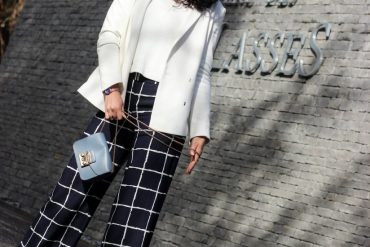Everyone wants to know how, but only few manage to do it. What am I talking about? Monetizing your blog! In this post I’m sharing some tips and tricks I’ve learned along the way and some general advice if you’re considering to take your blog to the next level.
First of all I’d like to tell you a little something coming from a personal perspective. I’ve been running this blog since a good two years. I’ve build up an engaged audience that grows steadily every month and I’ve also build up a pretty good social media following, if I may say so myself.
Per post I spend on average about 4 hours, from shooting it, editing, writing the article, including relevant links and posting on social media channels. The blog marketing posts I’ve been writing lately (here and here) probably take even longer. It might sounds like I’m bragging, but my point is: If I have an engaged readership and I put time and effort in creating high quality posts, then the brands that want to get featured have to pay for it. Receiving product in exchange for post isn’t sufficient: a wardrobe full of clothes and the newest beauty products isn’t going to pay my bills.
Before I’ll talk about blog monetization more detailed, you have to know that it’s not possible to demand payment from potential advertisers from the very beginning of your blog existence. You have to be able to look at yourself to judge what your blogs value is. I’m the first one to admit that one year ago my blog didn’t deserve as much on a monetization level as it does now. FashionContainer lacked consistency and my English wasn’t nearly as good as it’s now. This is a bit off topic, but do you know how much more time it takes for a not native English speaker like myself to write articles? Probably twice as much. That said, let’s get on to the ways you can earn through your blog and more importantly how to communicate money with advertisers. If you didn’t already notice, I’m extremely passionate about this topic, because I feel many bloggers out there settle with less then they deserve.
1. Make a media kit
Having a media kit is fundamental when you start working with brands. It’s a bit like a resume when you apply for a job, but a Media Kit represents everything that has to do with you and your blog. A few important things to mention in your media kit is your stats (unique visitors, page views, social media followers), brands you’ve previously worked with and a little bit of background information about yourself and your blog.
You can either make this a separate document or attach it with your media kit, but brands that are interested to collaborate with you would want to know the prices for certain services you offer.
Let’s say I’m offering the service of a sponsored post, in which I promote a brand or product by writing about it or wearing it. Besides writing down a price, it’s very important that you specify what a sponsored post includes. If you’re going to promote the post on your facebook page, Instagram and a daily tweet for a week, then mention that.
2. How to Talk Money
Opening the subject of money is never easy when you’re working with people. The first thing that should make it easier for you to determine where you stand, is to know your blogs value. Find out how many unique monthly visitors your blog has, how much time you spend to write a post from A to Z. What have you got potential advertisers to offer? Once you’ve got that figured out and you get an email from a brand that would like to work with you, kindly ask them what budget they have in mind for the opportunity. Then soon enough you’ll find out whether it’s a paid opportunity or a collaboration on the basis of product-in-exchange-for-post. You can decide case by case whether it’s something you’d like to take part in for the given conditions.
When you’re starting to treat your blog like a business, you shouldn’t wait until collaborations come to you. Reach out to the brands that you think suit your blog and you never know what it might bring you. It’s important though to always approach brands with a very self-started attitude. If you reach out by email, then explain briefly what kind of collaboration you have in mind and how that would benefit them. No one has got time for vague emails with “I thought maybe we can collaborate” without giving any further details.
3. Commission programs
Probably one of the biggest breakthroughs in blog monetization are commission programs such as Rewardstyle. If you’re not familiar with it: Rewardstyle enables bloggers like myself to earn a commission over the links people click and buy things of. When you’re using those links consistently in your outfit posts, it can bring you quite some income. I’m personally only familiar with Rewardstyle, but here’s a link to a helpful article that compares different programs out there.
4. Media agencies
From a personal point of view, I believe that media agencies are the future for bloggers who want to monetize their blogs. These agencies are basically the ‘middle man’ between bloggers and brands, and connect the two of them together. Let’s say I’m in charge of marketing at a brand and a new collection is going to launch in two months. I know that fashion blogs offer a great way of advertising, because they often have an engaged readership that respects and follows the sense of style of the blogger in question. However, I don’t have the time to research the market and find bloggers that are the right fit for my brand. At this stage I’d approach a reputable media agency that represents bloggers. Each of those bloggers that are signed at the agency have a media kit available, so I have a look to see which ones suit me best and then I come up with a budget that I’ve got to offer. The media agency takes a percentage and so does the blogger in question who will do a sponsored post for my brand.
Negotiating the price and the collaboration itself is time consuming, that’s why it’s great if you’ve got someone to simply give you an offer with all details provided and it’s up to you to say yes or no.
5. Pr agencies
If you’d have asked me two years ago what a PR agency does, I wouldn’t have a clue. That’s why I figured giving a short explanation wouldn’t be bad. PR (public relations) has everything to do with enhancing and promoting brands. If I would start my own label, it would be best for me to have a PR agency to help me to get media releases out there, make sure newspapers and in this new age, blogs write positively about me. The reason why PR agencies work with bloggers, is because they like to see the brands that they represent featured on blogs to gain more exposure. PR agencies play a role in the circle of blog monetization and it’s important to maintain a good relationship with them.
I hope these insights in the different factors involved in blog monetization were helpful. Do you have any thoughts on this subject? Please don’t hesitate to let me know in the comments below. You’re also more than welcome to ask any questions that you might have.
– Stay patient and Trust your journey



